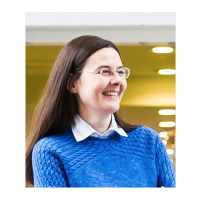News
Committed to Caring Award, Paola Cappellaro
Quantum scientist Paola Cappellaro works to ensure students are at their “best state, and moving towards one better,” according to student nominators. Cappellaro effectively navigates the balance between attending closely to students’ needs while also giving them space to explore.
Paola Cappellaro is a Professor of Nuclear Science and Engineering. She leads the Quantum Engineering Group at the Center for Ultracold Atoms at MIT and is a member of the Research Lab for Electronics. An expert in nuclear magnetic resonance, electron spin resonance, coherent control, and quantum information science, Cappellaro and collaborators developed the concept and first demonstrations of using impurities in diamonds to take quantum measurements. Her research aims to enable practical quantum nano-devices, such as medical sensors and stimulators, as well as develop deeper knowledge of quantum systems and their environments. Cappellaro has won multiple teaching awards at MIT and her research has been recognized with the Young Investigator Award from the Air Force Office of Scientific Research as well as a Merkator Fellowship.
Persevering in a pandemic
Many students had to make sudden, significant decisions about their lives or research in response to the pandemic. Cappellaro has been a reliable support, helping students decide whether to leave or remain on campus, ensuring students were provided funds from the Nuclear Science and Engineering Department to enable moves, and helping her laboratory group find ways to maintain connection and banter in virtual interactions.
A particular point of stress for many students is whether they will be able to move forward with their experiments and degrees, notes Cappellaro. In the short term, the lab has found ways to run their experiments remotely. Emphasizing the need to accommodate people with varied schedules, time zones, and child care in this trying time, Cappellaro is flexible in organizing group meetings and the research process. She notes, “I try to nudge people to reach out to each other even in lockdown” – and excitingly – “new collaborations among the group [have] sprout[ed] from this situation.”
Generous guidance
Cappellaro is keenly aware of students’ lives. Nominators fondly recall Cappellaro’s ability to summon details about minor experiments they conducted weeks before or wish them well on an event they had once mentioned in passing.
When a student is writing a paper or presentation, Cappellaro “proactively asks for… drafts and go[es] through multiple rounds of revisions with little turnover time,” according to student nominators. Likewise, when students are preparing for talks or qualifying exams, Cappellaro dedicates group meeting time to help them prepare.
Encountering research obstacles is de rigueur, particularly during graduate school. When students are stumped by experimental results, Cappellaro advises them to take “sideways steps” to consider the challenge from another angle. In her words, she aims to “cultivate and preserve [each] student’s love for research and science… especially when… things do not work out in the lab or because of external pressures.”
Reaching out
Life does not pause in graduate school. Students mention Cappellaro’s support across a wide array of experiences that have included illness, losing family members, starting a family, unfortunate experiences on qualifying exams, and training for the Boston Marathon. On such occasions, Cappellaro has reached out to students “to make sure emotionally and physically they were cared for, could take on the day, and [that they took] necessary breaks,” according to student nominators.
Cappellaro says that fostering “a caring and open community, where one feels valued and welcomed to ask and provide help,” is critical to enabling graduate students to be productive. Building such a friendly and inclusive work environment is a Mentoring Guidepost identified by the Committed to Caring (C2C) program. Cappellaro notes that the “best strategy [as an advisor is] to foster cohesion among the student group so that they care for each other and help each other out.” Group outings such as the lab’s annual ski trip have contributed to this feeling of community.
Seemingly tireless, Cappellaro also goes beyond her laboratory to attend to the community at large. She participates—and encourages advisees to participate—in several science outreach efforts at the MIT Museum, including the Science on Saturday program and the Cambridge Science Festival. Cappellaro is also active in the Nuclear Science and Engineering Department’s Rising Stars Symposium, organizing sessions and speaking to the multidisciplinarity of the field as well as ways to increase female representation.
Cappellaro’s efforts center on igniting and reigniting enthusiasm for discovery.
